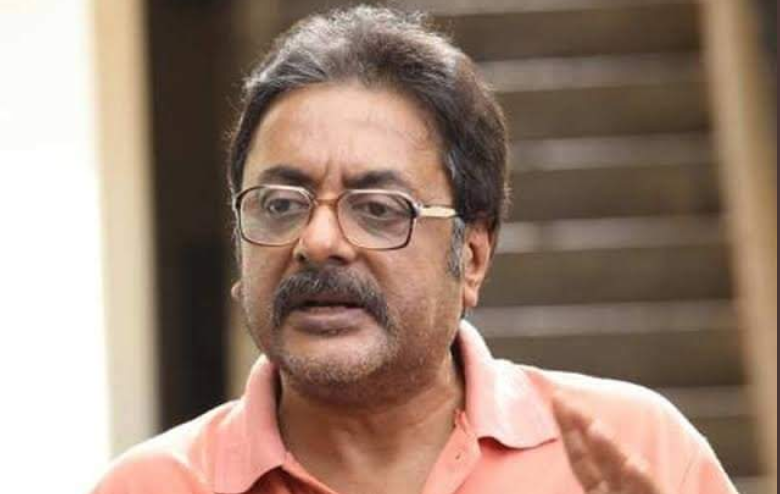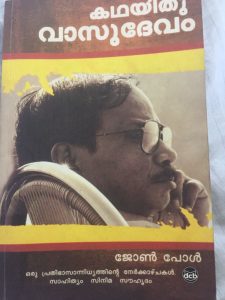
Pratap Pothen: The original hippy of Malayalam cinema

Pratap Pothen was a jack of many trades, an actor and writer-director, apart from being an ad-film maker.
Having made his mark in the Malayalam film industry with Thakara (1979) directed by Bharathan, Pratap made waves in Tamil cinema in the early 1980s with a string of acclaimed films and working with ace directors such as K Balachander and Balu Mahendra among others.
By the mid-1980s, however, Pratap turned to direction, mostly writing his own scripts, proving his love for cinema wasn’t ephemeral.
For a man born with a silver spoon to the wealthy Kulathunkal Joseph Pothen, businessman and a prime mover and shaker in Kerala politics, it wasn’t an easy choice to become an actor. True, his elder brother Hari (Harry) Pothen was a successful producer delivering hits under the Supriya banner, but the anglicised Pratap was very much a misfit for the conventional notion of a hero.
Pratap enjoyed acting, something he honed doing theatre in Madras as a student of the Madras Christian College, catching the eye of the then up-and-coming director Bharathan.
Pratap’s debut in Bharathan’s Aaravam (1978) co-starring Nedumudi Venu, didn’t go according to plan as magical realism was probably far ahead of its time in Malayalam cinema. But that didn’t deter Pratap from pursuing films and Bharathan’s next, Thakara, turned him into an overnight sensation, making him a household name in both Malayalam and Tamil cinema over the next few years.
And yet, success didn’t come easy for Pratap and the team of Thakara.
The versatile K.P.A.C Lalitha who passed away recently recounted in her memoir how Thakara defined the career of Bharathan, her husband, and the struggles that went behind the film-making.

Also Read: Malayalam actor-filmmaker Pratap Pothen passes away at 69
When the Cherthala-based novice producer Babu of the KVM group came to Bharathan, eager to bankroll his next project, the latter had one condition: that he would cast Pratap and Nedumudi Venu in it. But by the end of filming Babu had gone bankrupt and the film couldn’t get a distributor for many months. Finally, it was Hari Pothen who came to their rescue, helping its release and, the rest is history.
The sceptic in Hari Pothen saw that Pratap, younger than him by 12 years, had the acting chops to make his mark in cinema. But Pratap wished to chart his own course and choose characters he liked, often playing roles that were unconventional. Pratap went on to team up with Bharathan again in the successful Chamaram (1980) paired with Zarina Wahab.
By associating with the likes of Padmarajan, Mohan and Bharathan, Pratap became part of the original ‘new wave’ of Malayalam cinema in the early ‘80s. Perhaps that explains why he felt more at home in his second coming in Malayalam, in 2012, getting on like a house of fire with the younger lot of actors and when another ‘new wave’ was underway in Mollywood.
It is a shame that a classic like Novembarinte Nashtam (1982) scripted and directed by Padmarajan and starring Pratap, hasn’t attained cult status four decades later. Among Pratap’s finest work, the film was far ahead of its time and had Padmarajan himself dubbing for him.
Fittingly, Aashiq Abu-directed 22 Female Kottayam (2012) which marked Pratap’s comeback in 2012, had shades of Novembarinte Nashtam, although somehow nobody pointed that out during its release. But the film that gave Pratap a second wind in Malayalam was Ayalum Njanum Thammil (2012), where he infused life into the infectious doctor character, Dr Samuel.
Says Sanjay of the Bobby-Sanjay scriptwriter duo of the film: “We have this practice of describing our characters with a single word in our script; for Dr Samuel, it was divine/noble. It was director Lal Jose who actually suggested Pratap sir’s name and he brought so much gravitas to the role.”
Speaking to this writer nearly a decade ago, Pratap had described it as a “role of a lifetime” and how playing the character was an “enriching” experience for him.
Aashiq Abu went on to repeat Pratap in the stoner film Idukki Gold (2013) where he played one of the leads in another memorable outing. Pratap’s best work was to follow in his hundredth outing in cinema, in Once Upon A Time There Was A Kallan (2014) for which he received a Kerala State Special Jury award that year.
The film had Pratap playing a 75-year-old Ousepachan with a bald pate and a typical gait, completely living the character in what was a brilliantly uncharacteristic portrayal. Although Pratap was keen to add more films to his resume as a director in Malayalam, possessing multiple scripts as he revealed himself back in 2014, somehow he couldn’t go on to accomplish it.
For someone who spent most of his adolescence and youth in Tamil Nadu, Pratap was probably an odd choice to direct M.T Vasudevan Nair (who celebrated his 89th birthday on July 15)’s Rithubhedam in 1987. Having won accolades and a national award as the ‘Best Debut Director’ for Meendum Oru Kaathal Kathai in Tamil, Pratap’s competence was never the issue but his lack of acquaintance with MT’s universe, of the unravelling of matrilineal Tharavads in Kerala. Pratap took the master in MT by surprise, by undertaking rigorous research before making the film.
Writes scenarist John Paul who passed away recently in the book Kadhayithu Vasudevam published by DC Books: “For someone who wasn’t well versed with the world of MT’s plots, of the pathayapuras, padippuramalikas and kayyalappuras, some of us were sceptical whether Pratap could do justice to the script. But he took us all by surprise by deftly capturing the life of an ettukettu with natural ease.”
Pratap followed up Rithubhedam with the musical love story Daisy (1988), his ode to his alma mater Lawrence School, Lovedale, the institution that really shaped the individual in him. Pratap captured the 750-acre campus and the lovely woods in all their beauty in Ooty’s serene backdrop in Daisy which turned out to be a massive commercial hit.
He went on to direct many movies in Tamil including the Kamal Haasan-starrer Vetri Vizha (1989) based on Robert Ludlum’s Bourne series, even before Hollywood thought of adapting the novels into films. Pratap made the Telugu film Chaitanya in 1991 among other films before concluding that phase with Oru Yathramozhi in Malayalam.
For a decade after that Pratap went completely off-radar, occasionally making ad films. He made a low-key comeback in 2005 as an actor, playing bit roles, before going on to become active once again post 2012.
Although one might be compelled to argue that Pratap’s promise and talent remained largely unfulfilled, his friends and folks attest that he was content to have lived life on his own terms. Packed off to a boarding school at the age of five, Pratap made many friends at Lawrence who remained his mates for life.
Although his illustrious father switched loyalties from the Communist Party of India to Congress to Kerala Congress, Pratap was a self-avowed Marxist.
The original hippy of Malayalam cinema, Pratap was a voracious reader who could hold forth on anything under the sun, with a fine taste for music and art.

